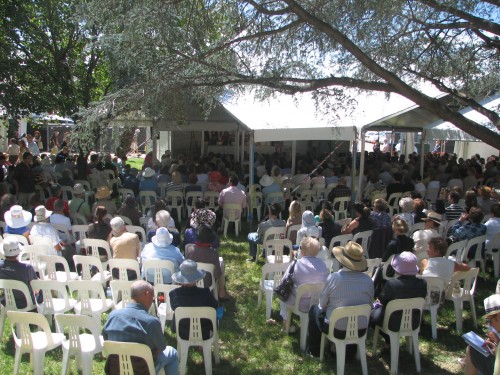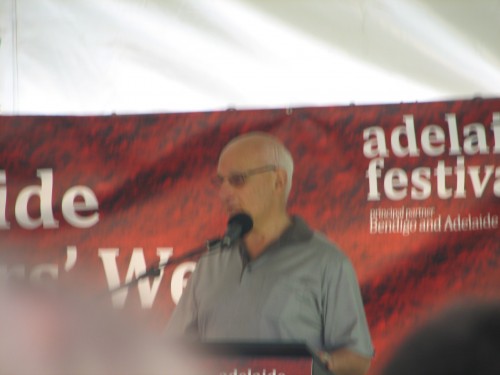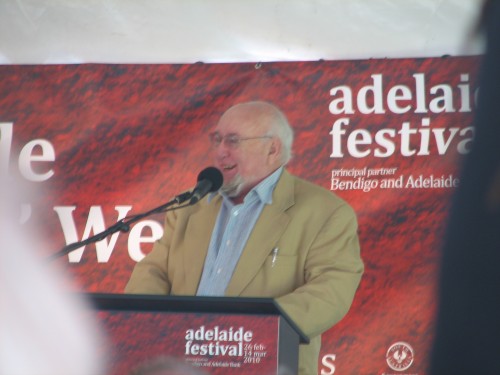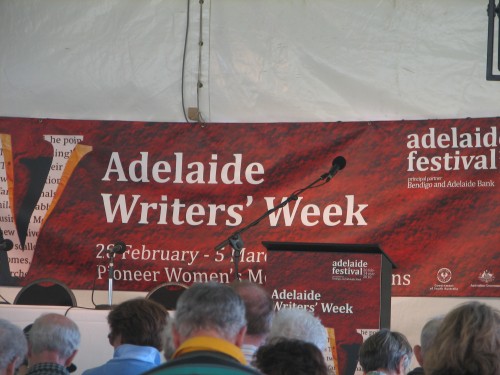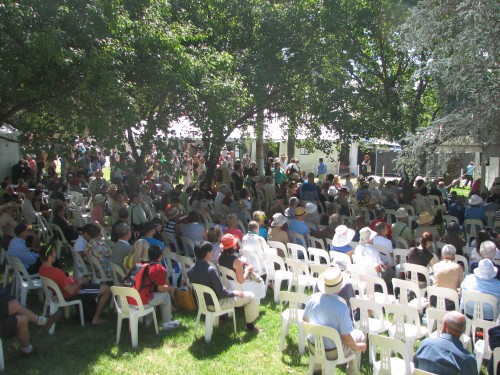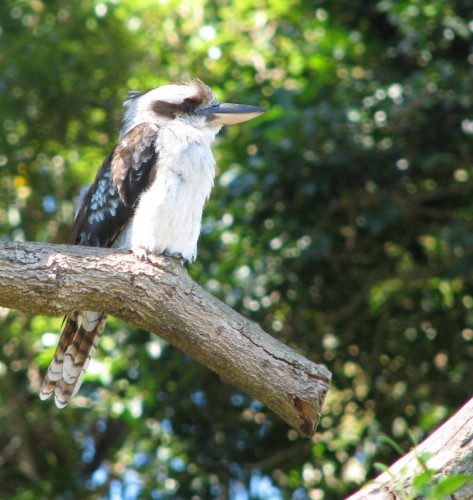Where are the writers for children?
Adelaide Writers’ Week 2010
Last week I attended three days of the week long Adelaide Writers Week. This biennial event is an integral part of the Adelaide Festival of Arts here in South Australia, one of the leading such festivals of its kind in the world. The list of guest speakers is often a who’s who of the writing world. This time was no exception and the impressive parade of talented writers throughout the week was very inspiring. I thoroughly enjoyed the experience.
But where were the writers for children?
They were conspicuous by their almost total absence.
Almost.
Only Markus Zusak could be said to be a writer for children – a debatable point as his audience is best described as Young Adult.
Australia has an impressive number of world class writers for children. They lead the world in their chosen field. They are acknowledged around the globe for their talent and many outsell their adult counterparts. Why, then are they totally ignored festival after festival?
Is this a case of literary snobbery on the part of the organising committee? Or ignorance?
A talented panel of writers
Adelaide Writers’ Week 2010
On the first morning of this year’s Adelaide Writers’ Week I was suddenly struck by the importance of the opening session. The panel on stage was a who’s who of Australian literature. Chair of the session was novelist David Malouf. The keynote speaker was novelist and historian Tom Keneally. The chairman of the Writers’ Week Advisory committee was South African born but now Adelaide resident, novelist and Nobel Prize for Literature winner John Coetzee. And finally there was renowned poet Tom Shapcott, who received the honour of the whole week being dedicated to him. His latest book of poetry was launched soon after the opening.
What a line up of talented, prominent writers!
It was inspiring to be in the company of such eminent men of letters.
Adelaide Writers’ Week Day 1 Feb 2010
Today I attended the first day of the Adelaide Writers’ Week for this years’ Festival of Arts. This is an important and well attended part of the biennial Adelaide Festival of Arts. This time it’s the 50th Anniversary of the Festival and this week our premier announced that from 2012 it will become an annual event (a promise if he is elected again in a few weeks time!)
Adelaide Writers’ Week is regarded highly as the leading festival for writers in Australia, and one of the best in the world. A large group of international and Australian writers gather here every two years for a feast of talking about books, writing and literature.
I’ve only ever had the chance to attend once before and I am the poorer for this. (Because sessions are held during the day I couldn’t attend while I was still classroom teaching a few years back – in another life.)
Today the festivities were opened by none other than Tom Keneally (Schindler’s Ark), a very engaging and entertaining speaker. I didn’t realise he had such a clever wit and sharp humour.
Below I’ve included some photos of the setting in the Pioneer Women’s Memorial Gardens, a five minute walk from the heart of Adelaide.
I am planning to attend again tomorrow and later in the week. I’ll bring more reports as we go.
Australia Day 2010 honours our writers
January 26th is Australia Day, a special day celebrating the first landing of European settlers in Sydney Cove, 1788.
The day is celebrated in many ways: family gatherings, picnics, barbecues, going to the beach, attending sporting events or just having a lazy day in the middle of the Australian summer.
Every year for the last few years Australia Post has celebrated the event by issuing a special set of postage stamps called Australian Legends. This series of stamps features people who have made a major contribution to Australian life and culture.
This year the stamps are called Australian Legends of the written word. They highlight the works of six of our most prominent writers. The writers honoured in this way are Peter Carey, David Malouf, Colleen McCullough, Bryce Courtenay, Thomas Keneally and Tim Winton.
I think it is wonderful that our leading novelists have been honoured in this way. Writers in Australia are often overlooked for the massive contribution they have made to our culture. Each of the writers featured are truly deserving of the honour.
Where are they?
Of course, by featuring these six writers, many other well deserved writers have been overlooked. In the field of novelists another 15 to 20 worthy recipients could have been listed, including Nobel Prize winner J.M. Coetzee. Admittedly, he was born in South Africa but now resides here in my home state of South Australia. Bryce Courtenay was also born in South Africa, so here is an inconsistency in the choice of recipients. And what of Patrick White, Helen Garner, Kate Grenville, Peter Goldsworthy, Robert Dessaix and Elizabeth Jolley? The list could go on and on. Then you have the great writers who are no longer contemporary, such as Henry Lawson and Banjo Paterson.
My major gripe however is that no poets or children’s authors are represented. Judith Wright, Les Murray, Bruce Dawe and Gwen Harwood have all had significant influences in the field of poetry. That’s just four I could name from dozens of worthy recipents.
Australian children’s authors lead the world in their field. Writers like Colin Thiele, Mem Fox, Sonya Harnett, Ivan Southall and dozens more have had or continue to have a significant impact on young readers around the world.
I guess that Australia Post had a difficult job narrowing the choice down to just six writers, but a little balance in the final six would have been nice.
Links:
- Australian Legends of the written word
- Peter Carey
- David Malouf
- Colleen McCullough
- Bryce Courtenay
- Thomas Keneally
- Tim Winton
The importance of Writing Classes
Salisbury Writers’ Festival 2009 #2
Tom Keneally (Schindler’s Ark) was the keynote speaker on the morning I attended this year’s Salisbury Writers’ Festival. He was to speak on the topic ‘Telling a good story’ but like a many storytellers he meandered all over the place, colouring his address with some wonderful anecdotes about the writer’s life and in particular his own life as a writer.
Writing classes
Tom spoke briefly about writing classes. It sounded like he is not all that keen about writers attending such classes even though he has taught some of them himself over the years. He said that you don’t have to attend writing classes to be a writer. His main emphasis was on the importance of writing every day. Regular writing, he maintained, was the key to becoming a good writer. While I agree with him on this latter point, I still feel that attending writing classes can be very useful.
Before I commenced my studies for my Master of Arts in Creative Writing I was a disciplined writer keen to be successful. I was writing every day sometimes 4 to 5 hours daily. I had written over a million words-give or take a few tens of thousands-and had some publishing success. My studies, however, have taken my writing to a whole new level of competence.
In workshops I have had to present drafts of my writing on a regular basis. I received immediate feedback and critical analysis from both lecturers and fellow students. One quickly learns the craft of writing when your writing is constantly under scrutiny in this way. At first it was confronting, sure, but as the months rolled by I learned to welcome these critiques-provided they were honest and constructive. And all the time I could see the quality of my writing improve far beyond what I had been able to achieve previously. The quantity of my writing also improved-an added bonus.
While it may not be for everyone, I would encourage all writers-and especially beginning writers-to seek out a writing class or critique group near where they live.
Good writing.
